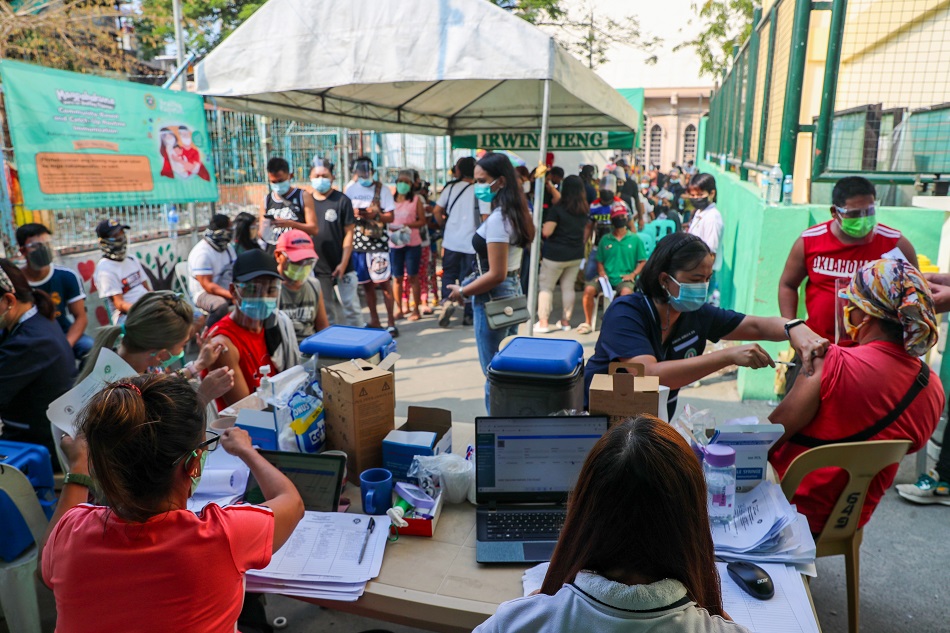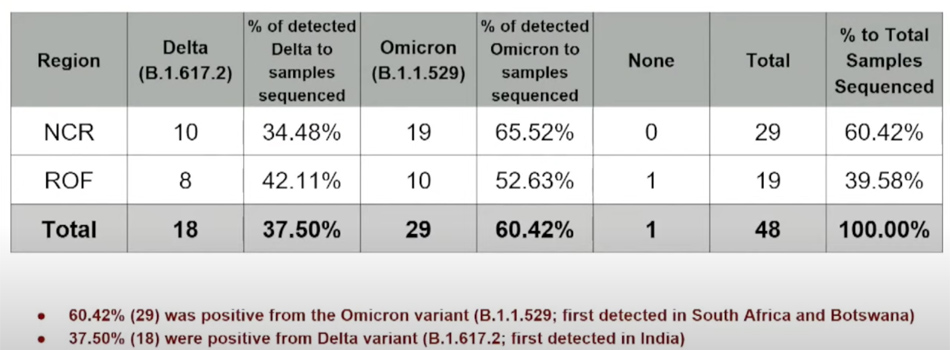Duque says omicron now the dominant COVID-19 variant in PH | ABS-CBN

Welcome, Kapamilya! We use cookies to improve your browsing experience. Continuing to use this site means you agree to our use of cookies. Tell me more!
Duque says omicron now the dominant COVID-19 variant in PH
Duque says omicron now the dominant COVID-19 variant in PH
ABS-CBN News
Published Jan 11, 2022 12:40 AM PHT
|
Updated Jan 11, 2022 02:05 AM PHT
MANILA—Health Sec. Francisco Duque III said the COVID-19 omicron variant is now the dominant variant in the Philippines, based on the latest whole genome sequencing run.
MANILA—Health Sec. Francisco Duque III said the COVID-19 omicron variant is now the dominant variant in the Philippines, based on the latest whole genome sequencing run.
In the latest whole genome sequencing done January 3, 29 out of the 48 samples tested were of the omicron variant, while 18 samples were of the delta variant.
In the latest whole genome sequencing done January 3, 29 out of the 48 samples tested were of the omicron variant, while 18 samples were of the delta variant.
"So siya na po 'yung nagdodominate na variant, whereas before it was the delta. So 60 percent of all the sequence ran, omicron na po," Duque said.
"So siya na po 'yung nagdodominate na variant, whereas before it was the delta. So 60 percent of all the sequence ran, omicron na po," Duque said.
(This is already the dominant variant, whereas before it was the delta. Sixty percent of all the sequence ran showed the omicron variant.)
(This is already the dominant variant, whereas before it was the delta. Sixty percent of all the sequence ran showed the omicron variant.)
ADVERTISEMENT
Duque also said that the average daily reported cases went up by 690 percent from January 4 to 10, with an average daily increase of 20,481 cases. It was relatively lower compared to the 726 percent increase recorded from December 28 to January 3.
Duque also said that the average daily reported cases went up by 690 percent from January 4 to 10, with an average daily increase of 20,481 cases. It was relatively lower compared to the 726 percent increase recorded from December 28 to January 3.
This also meant that the whole Philippines is at critical risk classification for COVID-19.
This also meant that the whole Philippines is at critical risk classification for COVID-19.
Besides the National Capital Region, Regions 4A and Region 3 were critical risk, while Cordillera Administrative Region, Regions 2, 1, 6, 5, 7, 4B and 11 were high risk.
Besides the National Capital Region, Regions 4A and Region 3 were critical risk, while Cordillera Administrative Region, Regions 2, 1, 6, 5, 7, 4B and 11 were high risk.
Duque added there was an increase in the hospital, intensive care unit and mechanical ventilation utilization rates nationwide.
Duque added there was an increase in the hospital, intensive care unit and mechanical ventilation utilization rates nationwide.
Forty percent of hospital beds nationwide are being used for COVID-19 cases, while 38 percent of intensive care units are occupied. Seventeen percent of mechanical ventilation are also being used.
Forty percent of hospital beds nationwide are being used for COVID-19 cases, while 38 percent of intensive care units are occupied. Seventeen percent of mechanical ventilation are also being used.
ADVERTISEMENT
"Karamihan ng mga rehiyon ay nagkaroon ng kani-kaniyang pagtaas ng tatlong panukatan, kaya naman aming pinapaalalahan ang mga ospital na bigyang prayoridad ang pagtanggap ng ating mga moderate, severe at critical cases at makipag-ugnayan sa ating One Hospital Command Center upang mai-refer ang mga mild at asymptomatic na pasyente sa mga temporary treatment and monitoring facilities (TTMF) at kung papasa sa requirements, ay maaring sa kani-kaniyang mga bahay na po mag-isolate," Duque said, adding that this can help decongest hospitals.
"Karamihan ng mga rehiyon ay nagkaroon ng kani-kaniyang pagtaas ng tatlong panukatan, kaya naman aming pinapaalalahan ang mga ospital na bigyang prayoridad ang pagtanggap ng ating mga moderate, severe at critical cases at makipag-ugnayan sa ating One Hospital Command Center upang mai-refer ang mga mild at asymptomatic na pasyente sa mga temporary treatment and monitoring facilities (TTMF) at kung papasa sa requirements, ay maaring sa kani-kaniyang mga bahay na po mag-isolate," Duque said, adding that this can help decongest hospitals.
(Most of the regions saw an increase in these three categories, and that's why we are reminding hospitals to prioritize moderate, severe and critical cases, and coordinate with the One Hospital Command Center for the mild and asymptomatic patients so they can be referred to temporary treatment and monitoring facilities (TTMF) and if they pass the requirements, they might even be allowed to self-isolate at home.)
(Most of the regions saw an increase in these three categories, and that's why we are reminding hospitals to prioritize moderate, severe and critical cases, and coordinate with the One Hospital Command Center for the mild and asymptomatic patients so they can be referred to temporary treatment and monitoring facilities (TTMF) and if they pass the requirements, they might even be allowed to self-isolate at home.)
HIGHER NEW CASES, BUT WITH LESS SEVERE AND CRITICAL CASES
Duque said that compared to previous surges, there were less severe and critical cases despite the surge in new cases.
Duque said that compared to previous surges, there were less severe and critical cases despite the surge in new cases.
Of the 8,569 total hospital admissions as of January 9, 636 or 7 percent were severe, while 271 or 3 percent were critical cases.
Of the 8,569 total hospital admissions as of January 9, 636 or 7 percent were severe, while 271 or 3 percent were critical cases.
Duque said this showed that vaccination was effective in preventing severe and critical illness due to COVID-19.
Duque said this showed that vaccination was effective in preventing severe and critical illness due to COVID-19.
ADVERTISEMENT
"Ang sinasalamin po nito ay ang pagiging epektibo ng ating pagbabakuna at pagsunod sa minimum public health standards," he said.
"Ang sinasalamin po nito ay ang pagiging epektibo ng ating pagbabakuna at pagsunod sa minimum public health standards," he said.
(This shows that vaccines and following minimum public health standards are effective.)
(This shows that vaccines and following minimum public health standards are effective.)
Duque said the Philippines so far has had four surges, excluding the current one.
Duque said the Philippines so far has had four surges, excluding the current one.
"We actually already have four surges, ito 'yung March-April, July-August, March-April, August-September," he said.
"We actually already have four surges, ito 'yung March-April, July-August, March-April, August-September," he said.
The Philippines on Monday logged 33,169 new COVID-19 cases, the 3rd straight day it reported a record-high daily tally, data from the health department showed.
The Philippines on Monday logged 33,169 new COVID-19 cases, the 3rd straight day it reported a record-high daily tally, data from the health department showed.
ADVERTISEMENT
The health agency announced 26,458 and 28,707 new infections on Saturday and Sunday, respectively.
The health agency announced 26,458 and 28,707 new infections on Saturday and Sunday, respectively.
The Philippines' total case count has climbed to 2,998,530 cases, of which 157,526 or 5.3 percent were active infections, based on DOH data.
The Philippines' total case count has climbed to 2,998,530 cases, of which 157,526 or 5.3 percent were active infections, based on DOH data.
This the highest number of active cases since Sep. 24, 2021 when 173,408 were announced, according to the ABS-CBN Investigative and Research Group.
This the highest number of active cases since Sep. 24, 2021 when 173,408 were announced, according to the ABS-CBN Investigative and Research Group.
The current active cases are broken down as follows: 301 critical, 1,461 severe, 2,858 moderate, 147,912 mild, and 4,994 asymptomatic.
The current active cases are broken down as follows: 301 critical, 1,461 severe, 2,858 moderate, 147,912 mild, and 4,994 asymptomatic.
COVID-related deaths increased by 145 to 52,293. All of the new deaths were from Davao region, according to the DOH.
COVID-related deaths increased by 145 to 52,293. All of the new deaths were from Davao region, according to the DOH.
RELATED VIDEO
ADVERTISEMENT
ADVERTISEMENT



